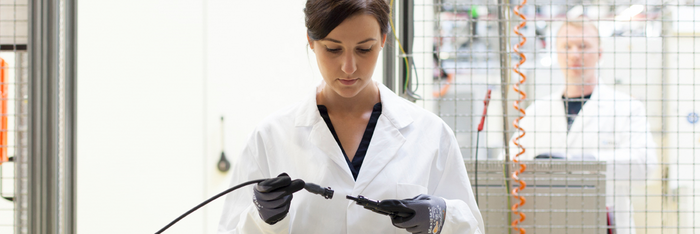A life-cycle assessment is a systematic analysis of a product’s environmental impact during its entire life cycle. This includes all environmental impacts during raw materials production, production, usage, transport, product disposal and associated upstream and downstream processes, such as the production of raw materials, additives and consumables.
The environmental performance of Qcells products over their entire life cycle is of prime importance to us. By including information from processes which are upstream and downstream from actual production at Hanwha Qcells locations, we also take responsibility for environmental impacts which occur in the supplier chain and during disposal. We are working to create life-cycle assessments for our products during all stages of their life, from silicon extraction, wafer manufacture and cell production through to module manufacture and the use of Qcells solar modules in ground- and roof-mounted systems.
These assessments take into account the production and packaging materials used, energy consumption, transport distances, emissions and waste produced at each life cycle stage. This enables us to obtain a complete picture of the environmental impact that our products have and to work actively on providing improvements. Using an assessment software application and a scientifically sound database allows us to ensure that findings are comparable and based on solid facts. Results from this analysis comprise a comprehensive CO₂ footprint and energy-returned -on- energy-invested times. If we take a reference value, it is clear that Qcells solar modules are more energy-efficient and significantly more climate-friendly than the average module.
Our energy-efficient solar modules thus allow us to help protect the climate as generating CO₂-free electricity releases fewer emissions into the environment than fossil-fuel energy producers, for example. The transparent presentation of results is important to us, as understandable statistics play a significant role in promoting the changeover to renewable energy sources worldwide.
Energy payback time
The energy payback time of our modules installed on a representative roof system amounts 1.42 years. The energy payback time of our modules without system components amounts 1 year. The data includes all stages of the life cycle.
Excess energy
The excess energy shows the amount of times the electricity generation in the use phase exceeds the invested energy in the production process.
Energy demand separated of the different components
The presentation shows which production stage in the life cycle of a PV module is the most energy intesive one. In this case the wafer production has the biggest ratio (55.3%) followed from the module conversion (19.8%).
Carbon footprint
The carbon footprint shows the carbon dioxide equivalent emissions of a product througout its complete life cycle.


